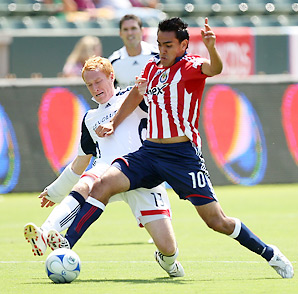
Put up or shut up for Chivas USA
Unfortunately for the franchise, that's still a pipe dream. So far, it has been a series of missed opportunities for Chivas USA. Instead of being Chivas de Guadalajara's American arm, the two are sister clubs who don't do enough to foster their relationship. And the talent that has flowed from Mexico to Major League Soccer hasn't exactly been of the difference-making variety.
Chivas USA has another opportunity to break through and create history. The team's Western Conference semifinal series against the archrival Los Angeles Galaxy could be the club's loftiest accomplishment to date. (The teams are tied 2-2 after the first leg and meet in the second leg on Sunday, 7:30 p.m. ET, ESPN2.) A win would help Chivas USA claim its first playoff series triumph, and to achieve that against the Galaxy would be an added and huge bonus.
Whatever the result, it's clear the club needs something grand in 2010 to change its lackluster history. Winning an MLS Cup would be a great accomplishment but, short of that, Chivas USA will start 2010 the same it has these last several seasons: wondering what it can do to break through and make a mark in MLS.
Stockpiling its roster with a big Mexican name seems like the first and most important step to accomplish that, but it's a dangerous notion. Mexican players have had a checkered history in MLS. Sure, Cuauhtémoc Blanco has been successful in his three-year MLS stint, but players from Jorge Campos and Carlos Hermosillo to Duilio Davino and Daniel Osorno struggled to find their way in this league. What's worse, several have gone on to revive their careers in Mexico, as Davino and Osorno did with Puebla last season.
Trying to bring in a high-profile Mexican player hasn't worked for the club so far -- Francisco Palencia has been the closest the team has had to that, and the hole he left upon his departure after the '06 season still hasn't been filled. But Chivas USA hasn't even hit on the mid-level Mexican talent. The first-year roster was stocked young Mexican talent that developed into nothing, and subsequent years have netted such finds as Jesús Morales, Johnnie García and Jorge Barrera.
This year, Chivas USA's roster includes Mariano Trujillo and Eduardo Lillingston, both capable players who cannot seem to find their way on the field. And the relationship with Guadalajara netted Jesús Padilla this season, an American-born player whom the club had its eyes on for several years but who has struggled to find playing time.
Luring a high-profile Mexican star is not the answer for this club. The odds of acquiring a Davino instead of a Blanco are high, and such an acquisition would only deal the club another blow. The team reached for top-level talent in '06 when it traded away its Designated Player slot to New York in exchange for Amado Guevara. That has been a point of contention for the club, which hasn't been able to pursue high-priced talent since then.
However, it may have been a blessing in disguise precisely because it has prevented the team from chasing after potentially overpaid and underachieving Mexican talent. After all, how well has Luis Ángel Landín worked out for Houston?
The good news for Chivas USA is that despite a lack of marquee talent, Mexican or otherwise, the fan support hasn't wavered for three seasons now. The club's attendance figures were nearly identical from '08 to '09, as the team averaged a hair more than 15,000 per home game each season. The co-tenant Galaxy, meanwhile, dropped off nearly 6,000 fans per game, making Chivas USA's unchanging figures seem even more remarkable.
And the Goats' first game against the Galaxy in the conference semifinals last weekend was truly a home game, as 25,218 turned out. A majority of the fans there were dressed in red-and-white and made more noise than the Galaxy's contingent of supporters. And the crowd was bigger than any of the Galaxy's previous playoff games at Home Depot Center.
Thus, landing a high-profile Mexican talent is not necessary to build its fan base. Chivas USA, after all, had a higher home-attendance average than Blanco's Chicago Fire, and outdrew successful Eastern clubs such as New England and Columbus.
Still, what will set Chivas USA apart will be playoff success. If the club fails to get past the Galaxy, it will have to live with the shame of four consecutive first-round exits, made even more difficult by having the dishonor of losing to its hated rivals.
A triumph over the Galaxy would provide a lift the club has needed since the beginning and would be a turning point for the franchise. Then, the club's history would start featuring promises fulfilled instead of neglected potential.




